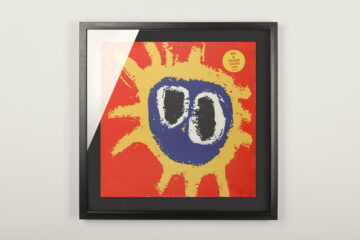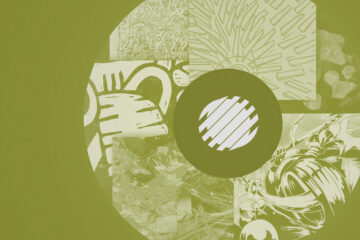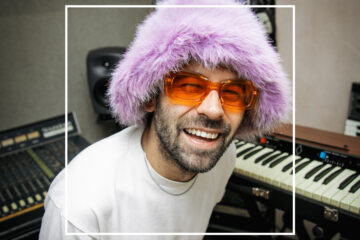Olf Van Elden, better known as Interstellar Funk, has been playing at Dekmantel parties for more than 10 years. On 25 March, the Amsterdam label released his debut album »Into The Echo«. An album that does not focus on one genre, but as a whole gives a coherent overall picture and tells the story of a talented artist who gave himself over to the studio during the pandemic and discovered the diversity of electronic music. In conversation with Franziska Nistler, the Dutch DJ talks about the making of his first album, his first points of contact with electronic music and at what point you should stop trying to improve something. How it all started with the Awakenings Festival, which well-known artist gives Van Elden piano lessons and of which song there were 30 different versions.
Olf, you’ve been making electronic music for almost ten years now. How did it all begin? When did you realise that electronic music existed?
My brother used to do parties in Amsterdam in a club called Club 11. That’s a long time ago, maybe 15 years. Me and my dad always used to go there to support him, I think I was 15 or 16. I remember he gave me a ticket to the Awakenings Festival for my birthday. That was my first full festival experience and I fell in love with the people and the music. I think that’s where it all started.
And how did you get into DJing yourself?
I moved in with my brother and he had a pair of turntables and records. We always had a lot of parties at home and that’s where I started trying to play records. You didn’t have CDJs back then so I was trying to beat match records. Later on I started going to Rush Hour to buy records and by going there so often, I started to get to know the people and go to parties more often. I think I was 18 when I got my first gig in Amsterdam. It was an illegal party in Amsterdam North in a place called The Bunker. In the same year I also played at a club called Flex Bar. I remember I was so nervous that I picked up a record from one turntable, turned around to select another record, and accidentally put the record on the turntable that was already playing instead of on the empty turntable…
Now that your first album is out: have you always wanted to produce an album?
It was always something that I had in my mind but because of the gigs I didn’t have that much time in the studio normally. Only when I worked full time in the studio, I really had the mindset, the time and the space to focus on an album. It was always a dream, but I needed the time to realize it.
Why Dekmantel?
We were planning to do a 12 Inch in 2020 and I already had those four tracks and wanted to make some real music around it and see if it fits as an album. In the end, none of those tracks came in its original form on the album but it was kind of a logical decision. They have been supporting me for a very long time. I’ve been playing for their parties for over 10 years already. So they’re good friends and it all made sense.
Tell us what »Into The Echo« was all about for you…
What I tried to create is an album that doesn’t really necessarily fit into one box or is focused on one genre. Of course it’s electronic music and I come from the club scene, but for me it’s important that it reaches more than only club music and functional techno. That’s exactly what I tried to create: to have different kinds of sounds and different kinds of genres all together as one album.
The sound of your album is very broad: How did you find it?
I worked for a record label and store for eight years so by being at Rush Hour every day, surrounded by all kinds of music definitely influenced my sound and also opened up a lot of interesting genres that I was not familiar with before. Like African music, Brazilian music, but also 80s wave and pop music. I think it’s something that will always keep growing and you will always find new directions you want to go to.
What I tried to achieve with the album and the tracks is that it’s more storytelling than just straightforward loops or functional music with kicks. For me it’s very important that it has a certain feeling of weirdness or something that you cannot directly place.
Interstellar Funk
Tell us, what criteria did the tracks for your album have to fulfill?
What I tried to achieve with the album and the tracks is that it’s more storytelling than just straightforward loops or functional music with kicks. For me it’s very important that it has a certain feeling of weirdness or something that you cannot directly place. I always tried to process a lot of sounds into something that sounds unrecognizable. I find it interesting when you like the music, but you cannot really place it directly.
Which track took you the longest to make?
I think the title track of the album, »Into The Echo«, took the longest. The track was basically completely finished but I couldn’t find the right drums and I think I had 30 different versions with different drums and was trying to make it way complicated with rhythms and stuff like that. In the end I figured out this track is more about the synths and the melodies than it’s about the drums. So I basically added a really simple kick, Hi-Hat and a rimshot and suddenly it was finished. It took me a really long time to get that figured out.
And which one was the fastest?
For example, »Octave Echoes« and »Last Piece of the Puzzle« are tracks I made in one day. I think 99 percent of the tracks were done in one day. Of course it needs more adjusting afterwards, but the idea and all the melodies came together in one day.
How was the collaboration with different artists for you?
I have collaborated with a few artists. One of them is Loradeniz. I started taking piano lessons during the pandemic and she’s my piano teacher. We really got along and she’s obviously a very good musician. We started to work on some music together and then I had this track and asked her if I could record her vocals in a certain way to layer it. That’s how that track came together.
The other artist I worked with was JASSS, Silvia. She’s a really good friend of mine and at some point, I got really stuck with the album with some of the tracks and she invited me to come to Berlin to work on it together. We worked together on a few tracks, but there was this one track she really liked and she changed the whole idea of the track. It was this more ambient kind of track and she turned it into something completely different with drums and stuff. Then we decided to work on it together.
Related reviews
Were there many situations where you thought you were stuck?
Oh, yeah. Especially at the end when I was talking with the label and sending them the tracks, the ideas of the tracklist and the track order. They kept on saying »it’s finished« and I kept on saying »no, it’s not finished«. That took a while. Then I had all these tracks that kind of had potential to be on there, but I couldn’t finish them. I kept on trying and trying and I couldn’t really get them done and then I took a little break. I started all over again with a new track and then suddenly it all came together.
At what point could you say “I’m done” without thinking of improving anything else?
There’s always room for improvement and especially because it’s a whole process. During the process, you also learn a lot of new stuff. So, at the end of the process of making an album, you are a better producer than two years before. I replaced a lot of older tracks with new stuff and I could have done that until now basically. You can keep on changing stuff, but at some point it felt good and they were satisfied. For me, I was satisfied with what I made in that period and probably the next album will be better but for now, it was good the way it is.
You say that during your album production there were also points where you didn’t get any further. What do you think is the most important thing you learned for yourself?
I think that I went in a certain direction, more away from not necessarily club stuff, but maybe more ambient stuff and stuff that I didn’t really make before. That really interested me more than when I started making this album’s music. I think that’s something I started to work on and that’s something I also want to keep on working on. It is more like a new direction that I kind of discovered during the process of this album.










